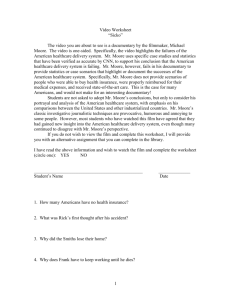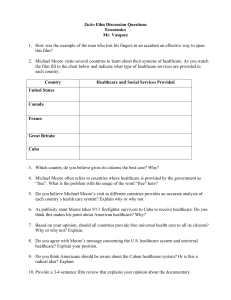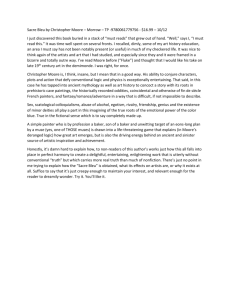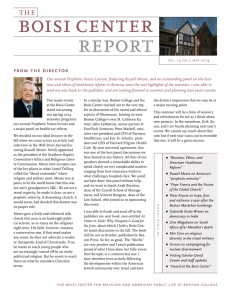Sicko Information Sheet / Discussion Questions
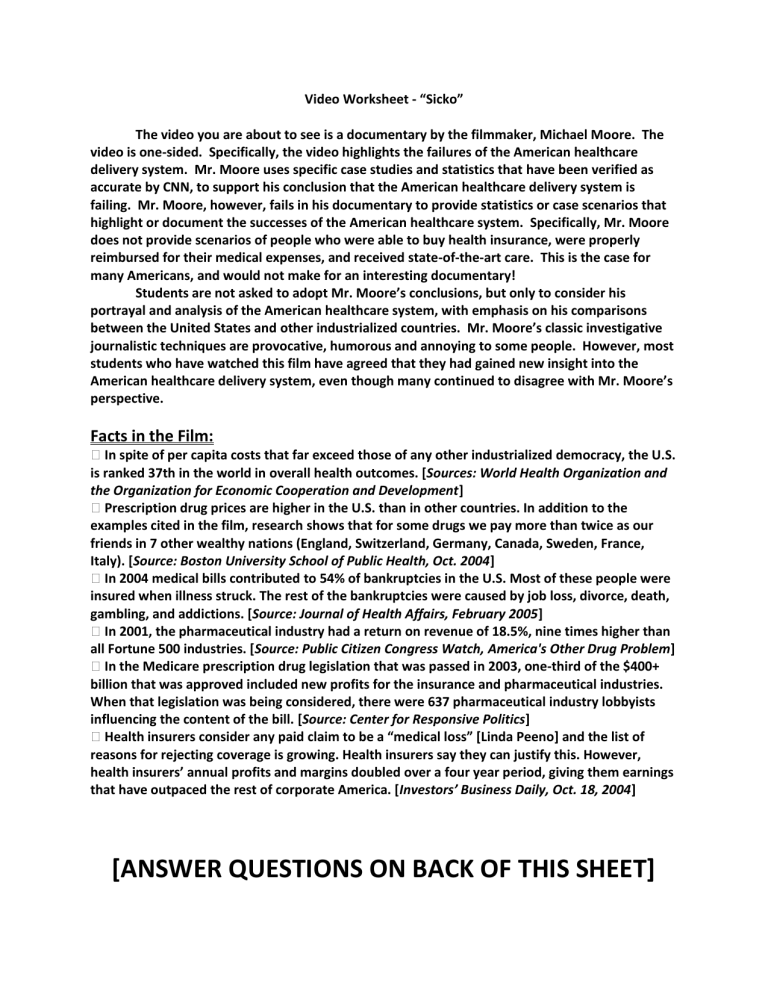
Video Worksheet - “Sicko”
The video you are about to see is a documentary by the filmmaker, Michael Moore. The video is one-sided. Specifically, the video highlights the failures of the American healthcare delivery system. Mr. Moore uses specific case studies and statistics that have been verified as accurate by CNN, to support his conclusion that the American healthcare delivery system is failing. Mr. Moore, however, fails in his documentary to provide statistics or case scenarios that highlight or document the successes of the American healthcare system. Specifically, Mr. Moore does not provide scenarios of people who were able to buy health insurance, were properly reimbursed for their medical expenses, and received state-of-the-art care. This is the case for many Americans, and would not make for an interesting documentary!
Students are not asked to adopt Mr. Moore’s conclusions, but only to consider his portrayal and analysis of the American healthcare system, with emphasis on his comparisons between the United States and other industrialized countries. Mr. Moore’s classic investigative journalistic techniques are provocative, humorous and annoying to some people. However, most students who have watched this film have agreed that they had gained new insight into the
American healthcare delivery system, even though many continued to disagree with Mr. Moore’s perspective.
Facts in the Film:
� In spite of per capita costs that far exceed those of any other industrialized democracy, the U.S. is ranked 37th in the world in overall health outcomes. [Sources: World Health Organization and
the Organization for Economic Cooperation and Development]
� Prescription drug prices are higher in the U.S. than in other countries. In addition to the examples cited in the film, research shows that for some drugs we pay more than twice as our friends in 7 other wealthy nations (England, Switzerland, Germany, Canada, Sweden, France,
Italy). [Source: Boston University School of Public Health, Oct. 2004]
� In 2004 medical bills contributed to 54% of bankruptcies in the U.S. Most of these people were insured when illness struck. The rest of the bankruptcies were caused by job loss, divorce, death, gambling, and addictions. [Source: Journal of Health Affairs, February 2005]
� In 2001, the pharmaceutical industry had a return on revenue of 18.5%, nine times higher than all Fortune 500 industries. [Source: Public Citizen Congress Watch, America's Other Drug Problem]
� In the Medicare prescription drug legislation that was passed in 2003, one-third of the $400+ billion that was approved included new profits for the insurance and pharmaceutical industries.
When that legislation was being considered, there were 637 pharmaceutical industry lobbyists influencing the content of the bill. [Source: Center for Responsive Politics]
� Health insurers consider any paid claim to be a “medical loss” [Linda Peeno] and the list of reasons for rejecting coverage is growing. Health insurers say they can justify this. However, health insurers’ annual profits and margins doubled over a four year period, giving them earnings that have outpaced the rest of corporate America. [Investors’ Business Daily, Oct. 18, 2004]
[ANSWER QUESTIONS ON BACK OF THIS SHEET]
c. a. b.
1. In this film, Michael Moore focuses on how the large health insurance companies and HMOs operate. What is the primary fiduciary (economic) responsibility of such companies? Or to put it another way, what is their ultimate purpose?
2. What are some of the ways in which that commitment to maximizing profit affects health care in the United States? Give examples from the movie: d.
3. Michael Moore, of course, is not a social scientist. I'd probably describe him as a muckraker in the tradition of the journalists who helped spur the Progressive movement in the early 20th century. I think you see his real talent in two episodes of the movie--his visit to France and the trip to Cuba.
Describe those two episodes and evaluate whether you think they are a fair reflection on the
American medical system? a. France b. Cuba
